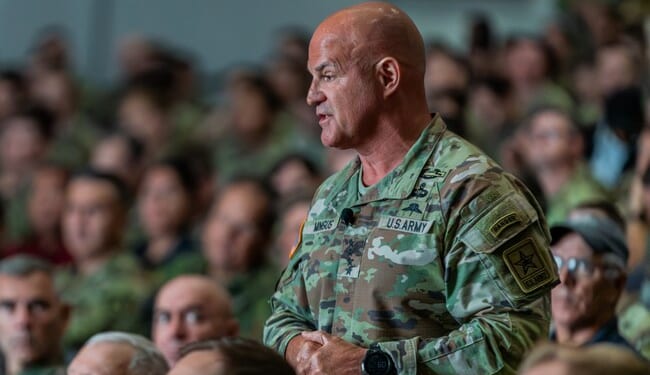
Secretary of War Pete Hegseth has acted to replace the number-two general in the U.S. Army, little more than halfway through his expected tour. The replacement of Army Vice Chief of Staff James Mingus came as something of a shock, as he was named vice chief of staff in January 2024 and should have served for at least 3 years. His replacement is Lieutenant General Christopher LaNeves, who is serving as Pete Hegseth’s senior military assistant. LaNeve is currently a three-star will vault over quite a few senior officers if confirmed by the Senate.
This is another case of a senior officer being suddenly removed from their position. Last week, it was USSOUTHCOM commander Admiral Alvin Holsey who was visited by the sky hook; see Did He Jump…Or Was He Pushed? US Top Commander for Latin America Abruptly Retires – RedState.
Up front, I don’t know either LaNeve or Mingus. But I will lay out why I think the unforeseen removal of Mingus looks suspicious. On paper, he’s a guy who should’ve been a shoo-in for great things given Pete Hegseth’s fixation on the warrior ethos. Mingus started out as a National Guardsman. He has impeccable credentials, having served in troop command assignments at every level, with a focus on elite infantry units. He commanded the 82d Airborne Division’s long-range surveillance company and the 75th Ranger Regiment’s Special Troops Battalion. He seems out of favor with the Trump administration. He was passed over as commander of USCENTCOM because, it is rumored, that he was buds with General Mark Milley.
Defense Secretary Pete Hegseth is backing a Navy admiral as his preferred choice for a key role commanding U.S. military operations in the Middle East, passing over an Army general who had been widely presumed to be the top contender amid an ongoing naval war in the region, according to defense officials and others familiar with the issue.
Vice Adm. Brad Cooper is Hegseth’s recommendation to head U.S. Central Command over Gen. James Mingus, the officials said, speaking on the condition of anonymity to discuss the Trump administration’s personnel considerations.
Several officials familiar with the issue said Mingus may have lost out on the Central Command job because of his association with retired Gen. Mark A. Milley, the influential former chairman of the Joint Chiefs of Staff whom Trump and Hegseth have repeatedly cast as a political adversary.
Lieutenant General LaNeve’s public record is less well documented than Mingus’s. He commanded Eighth Army in Korea and the 82d Airborne Division. I assume he commanded in combat, but didn’t find any specific mention of it.
Regardless, moving a four-star out of his job when he’s halfway through it, after passing him over for another position, looks a lot like Mingus is being pushed into retirement. Sending Hegseth’s right-hand military assistant into the position looks a lot like Hegseth wasn’t convinced that Mingus was down with his program, and that he was replacing him with someone who supports what Hegseth is trying to do.
The Schumer Shutdown is here. Rather than put the American people first, Chuck Schumer and the radical Democrats forced a government shutdown for healthcare for illegals. They own this. Help us continue to report the truth about the Schumer Shutdown. Use promo code POTUS47 to get 74% off your VIP membership.
















